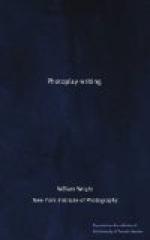Now, however, after both have acquired this knowledge of screen requirements, the trained fiction writer and the untrained photoplay writer cease to be on common ground. The writer of novels and short-stories has the advantage of years of—training, is the best word, meaning, in the present instance, both experience and special education. He has a tutored imagination; he has the plot-habit; he has an eye trained to picture dramatic situations; he sees the possibilities for a strong, appealing story in an incident in everyday life that to ninety-nine other people would be merely an incident seen for a moment and in a moment forgotten; he has at his command a dozen different ways of assisting himself to discover plot-germs for his stories—he is, in short, a workman knowing exactly what to do with the tools already in his possession, and when he acquires new tools he can, after some practise, use them with equal proficiency and skill. Furthermore, there can be no doubt that, once each has mastered the working rules of photoplay construction, the chances for quick and continued success are quite evidently in favor of the trained fiction writer—notwithstanding the fact that one man in a thousand without any previous knowledge of writing may become extremely successful.
3. What Chance Has the Novice?
Should the foregoing fact discourage the novice who has not had this previous literary training? The answer is, emphatically, YES! It should, it ought to—unless (and this is the secret of it all), unless he has ideas, and is the kind of novice who vows with every grain of determination in his make-up that he will soon cease to be a mere amateur, and will be recognized as one of the successful ones. Remember, every writer was once a beginner.
The reader may think, having read this much, that undue stress is laid upon the question of the previously successful writer and the ambitious but inexperienced amateur; it is this very insistence on the comparison, however, that should cause the earnest and determined aspirant to photoplaywright success to analyze more thoroughly the difference, and profit by a knowledge of how he may quickly advance himself to the position where the previously successful author will have little or no advantage over him.
Almost all who have had anything to say upon the subject of writing for moving pictures, but especially the writers of the advertising copy for most of the correspondence “schools” that offer “fake” courses of instruction upon the subject, have declared that there is “no experience or literary knowledge necessary” in order to become successful in the photoplay-writing field. One concern even advertises that the student “can learn this business in from ten to thirty days.” If by this is meant that the mere correct form of putting the work on paper with the aid of the typewriter—the mechanical arrangement of synopsis, cast, and scenario or continuity—can be picked up in that




